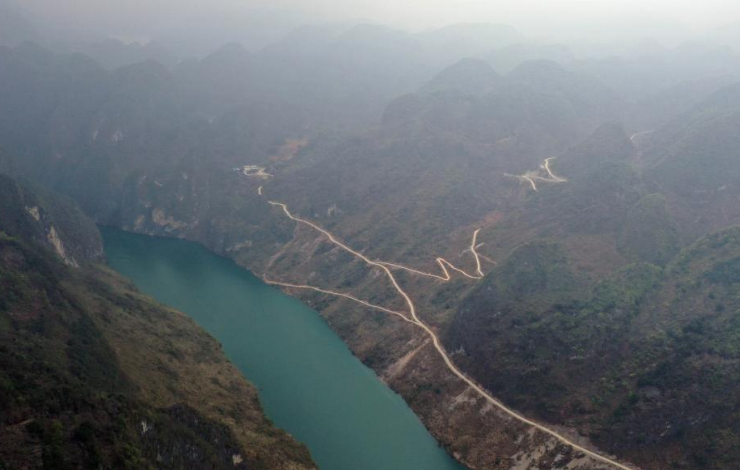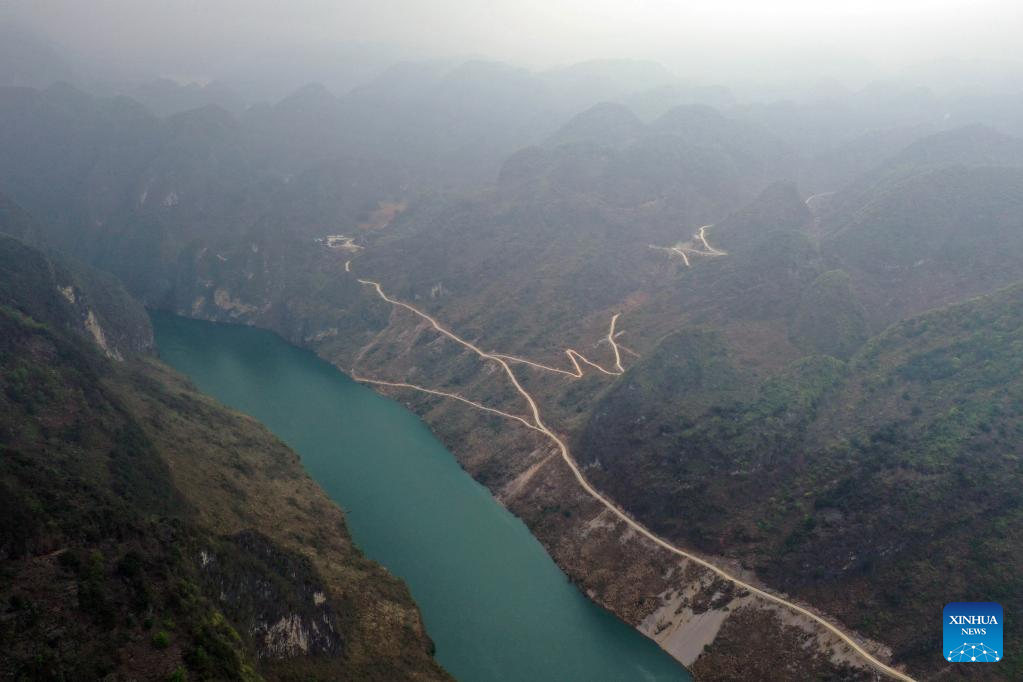
This aerial photo taken on March 20, 2023 shows Hongshui River, the water source of the drought resisting emergency water supply project in Bahao Village in Bansheng Township, Dahua Yao Autonomous County, south China's Guangxi Zhuang Autonomous Region.
Situated at the center of the Karst landforms in west Guangxi, Dahua Yao Autonomous County had suffered from severe water deficit for ages. Since 2012, local government has been managing the water deficit through various measures like building water tanks or reservoirs to collect water or constructing water supply projects which could divert river water onto mountain areas to ease water shortage and provide safe drinking water for local people. Afters years of efforts, safe and convenient water supply is no longer a problem for the over 200,000 rural population in Dahua. (Xinhua/Huang Xiaobang)
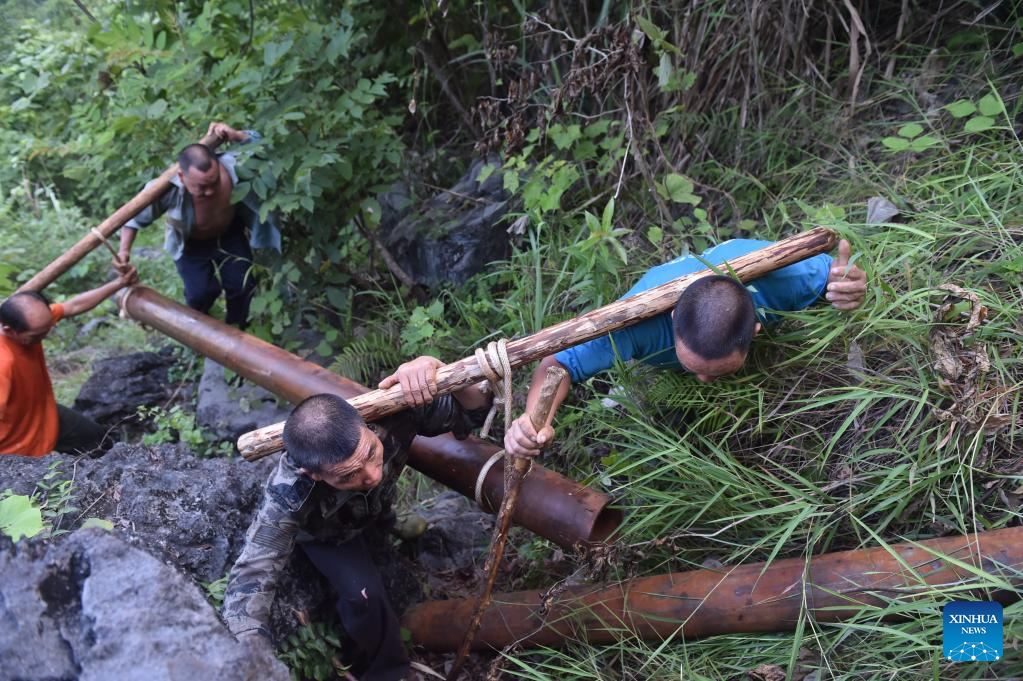
This photo taken on Aug. 18, 2016 shows villagers carrying water pipes on a mountain road in Nonglei Village of Bansheng Township, Dahua Yao Autonomous County, south China's Guangxi Zhuang Autonomous Region. Situated at the center of the Karst landforms in west Guangxi, Dahua Yao Autonomous County had suffered from severe water deficit for ages. Since 2012, local government has been managing the water deficit through various measures like building water tanks or reservoirs to collect water or constructing water supply projects which could divert river water onto mountain areas to ease water shortage and provide safe drinking water for local people. Afters years of efforts, safe and convenient water supply is no longer a problem for the over 200,000 rural population in Dahua. (Xinhua/Huang Xiaobang)
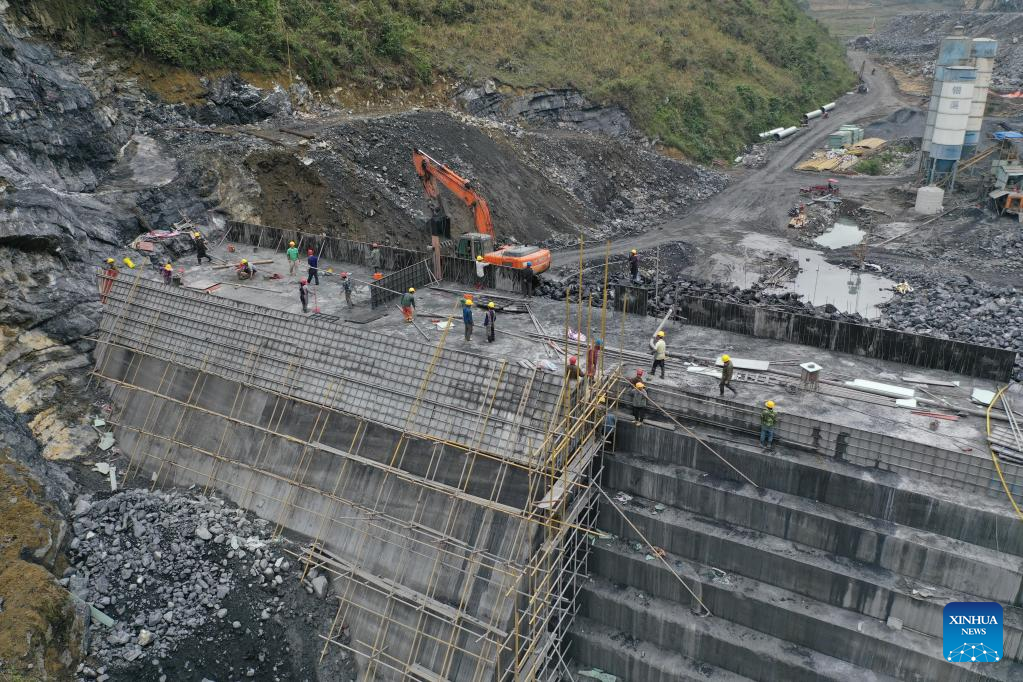
This aerial photo taken on March 15, 2021 shows the Wanglie reservoir construction site in Qibainong Township, Dahua Yao Autonomous County, south China's Guangxi Zhuang Autonomous Region. Situated at the center of the Karst landforms in west Guangxi, Dahua Yao Autonomous County had suffered from severe water deficit for ages. Since 2012, local government has been managing the water deficit through various measures like building water tanks or reservoirs to collect water or constructing water supply projects which could divert river water onto mountain areas to ease water shortage and provide safe drinking water for local people. Afters years of efforts, safe and convenient water supply is no longer a problem for the over 200,000 rural population in Dahua. (Xinhua/Huang Xiaobang)
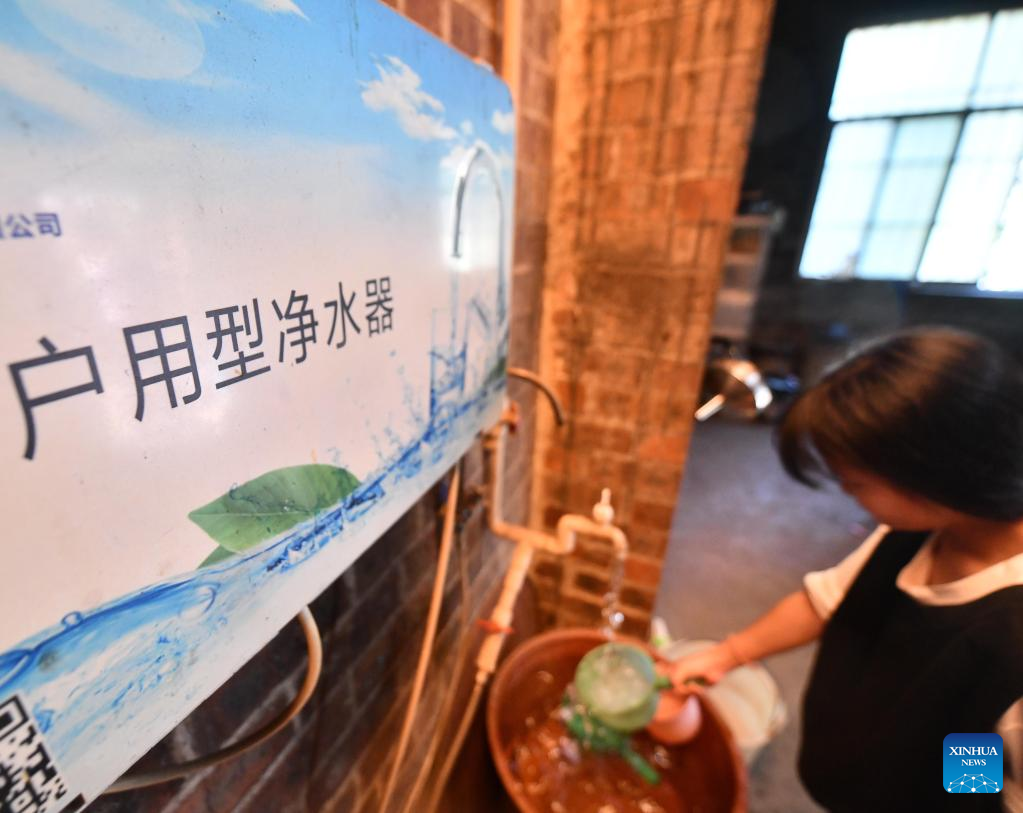
This photo taken on Feb. 6, 2021 shows a water purifier installed in Shanghe Village of Jiangnan Township, Dahua Yao Autonomous County, south China's Guangxi Zhuang Autonomous Region.
Situated at the center of the Karst landforms in west Guangxi, Dahua Yao Autonomous County had suffered from severe water deficit for ages. Since 2012, local government has been managing the water deficit through various measures like building water tanks or reservoirs to collect water or constructing water supply projects which could divert river water onto mountain areas to ease water shortage and provide safe drinking water for local people. Afters years of efforts, safe and convenient water supply is no longer a problem for the over 200,000 rural population in Dahua. (Xinhua/Huang Xiaobang)
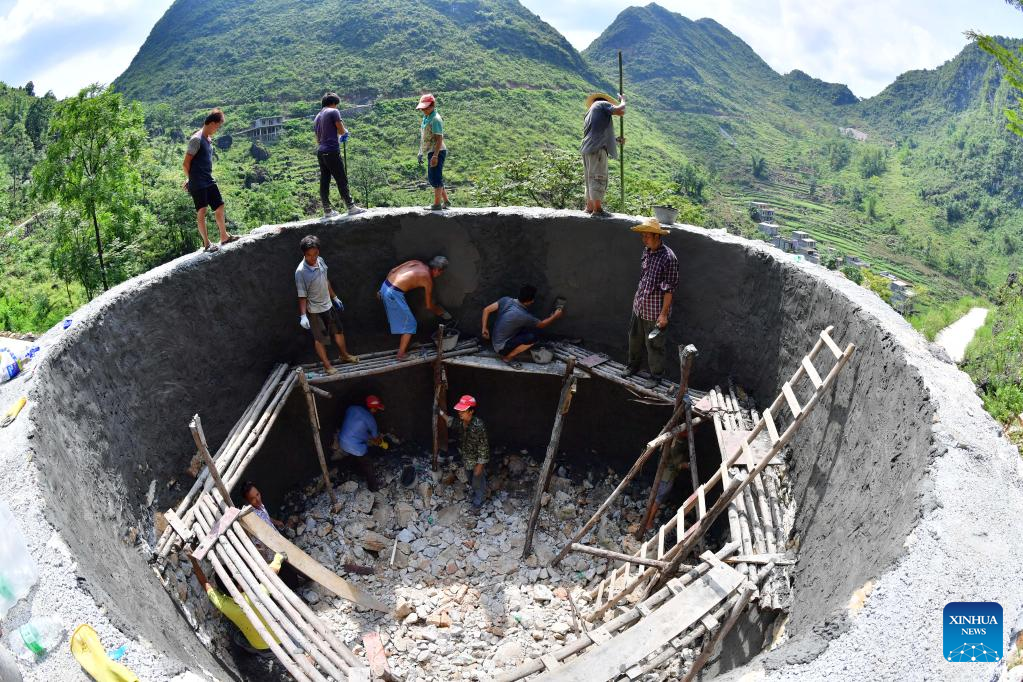
This photo taken on Sept. 2, 2017 shows villagers building a household water tank in Nongyong Village of Bansheng Township, Dahua Yao Autonomous County, south China's Guangxi Zhuang Autonomous Region. Situated at the center of the Karst landforms in west Guangxi, Dahua Yao Autonomous County had suffered from severe water deficit for ages. Since 2012, local government has been managing the water deficit through various measures like building water tanks or reservoirs to collect water or constructing water supply projects which could divert river water onto mountain areas to ease water shortage and provide safe drinking water for local people. Afters years of efforts, safe and convenient water supply is no longer a problem for the over 200,000 rural population in Dahua. (Xinhua/Huang Xiaobang)

This photo taken on Feb. 7, 2021 shows cadres checking on a drought resisting emergency water supply equipment at Bahao Village in Bansheng Township, Dahua Yao Autonomous County, south China's Guangxi Zhuang Autonomous Region.
Situated at the center of the Karst landforms in west Guangxi, Dahua Yao Autonomous County had suffered from severe water deficit for ages. Since 2012, local government has been managing the water deficit through various measures like building water tanks or reservoirs to collect water or constructing water supply projects which could divert river water onto mountain areas to ease water shortage and provide safe drinking water for local people. Afters years of efforts, safe and convenient water supply is no longer a problem for the over 200,000 rural population in Dahua. (Xinhua/Huang Xiaobang)
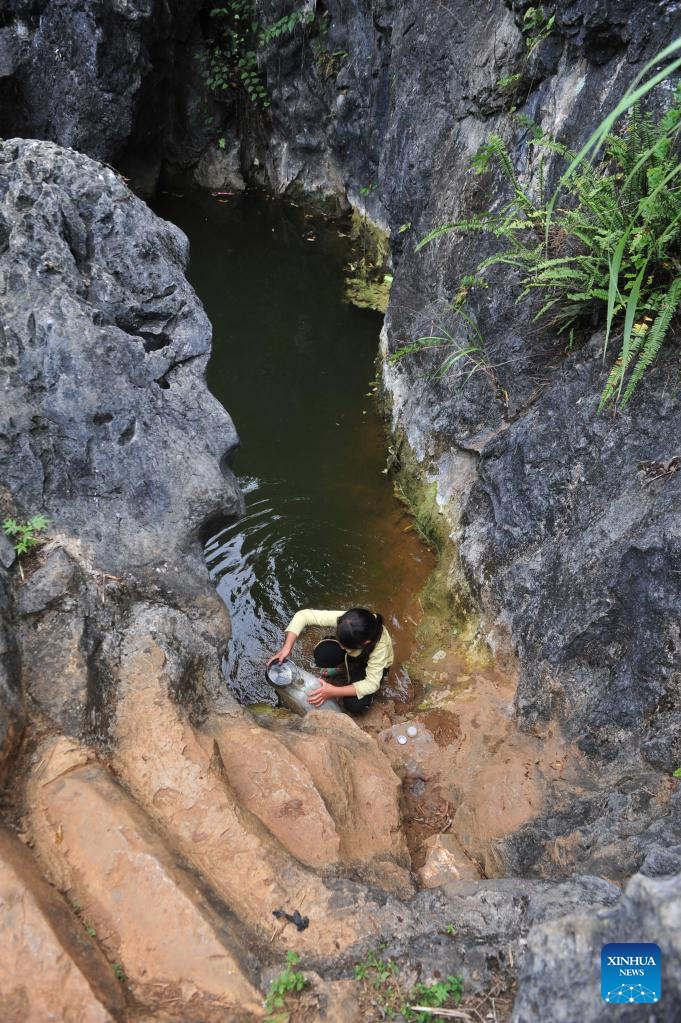
This photo taken on Sept. 3, 2012 shows a villager collecting water at a low-lying area on a mountain in Nonglei Village of Bansheng Township, Dahua Yao Autonomous County, south China's Guangxi Zhuang Autonomous Region.
Situated at the center of the Karst landforms in west Guangxi, Dahua Yao Autonomous County had suffered from severe water deficit for ages. Since 2012, local government has been managing the water deficit through various measures like building water tanks or reservoirs to collect water or constructing water supply projects which could divert river water onto mountain areas to ease water shortage and provide safe drinking water for local people. Afters years of efforts, safe and convenient water supply is no longer a problem for the over 200,000 rural population in Dahua. (Xinhua/Huang Xiaobang)
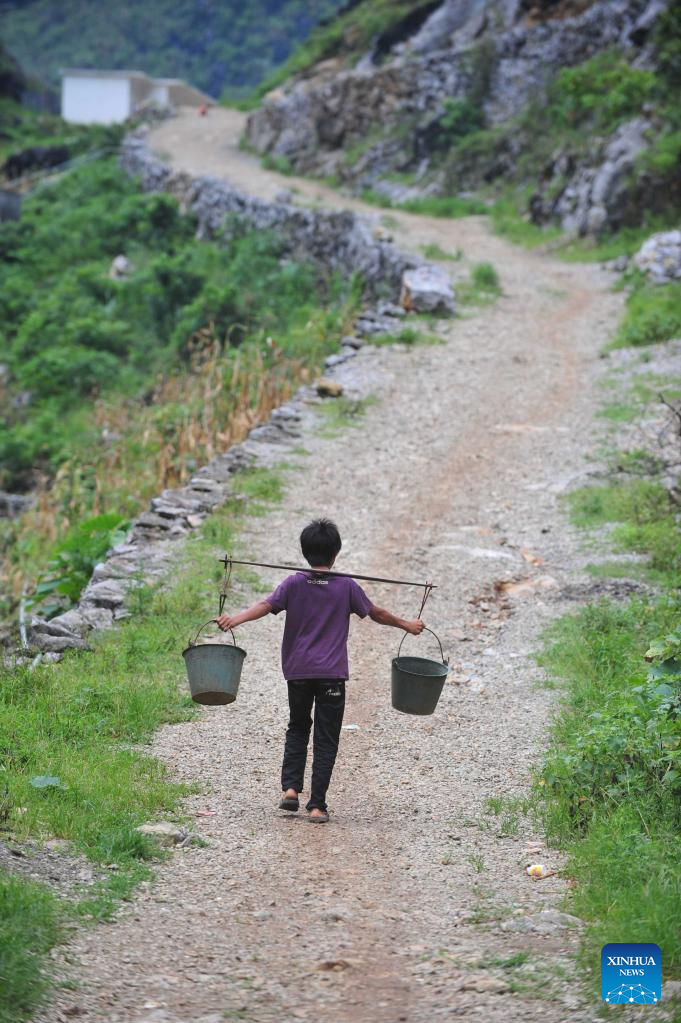
This photo taken on July 16, 2012 shows a villager go uphill to carry water in Nongyong Village of Bansheng Township, Dahua Yao Autonomous County, south China's Guangxi Zhuang Autonomous Region.
Situated at the center of the Karst landforms in west Guangxi, Dahua Yao Autonomous County had suffered from severe water deficit for ages. Since 2012, local government has been managing the water deficit through various measures like building water tanks or reservoirs to collect water or constructing water supply projects which could divert river water onto mountain areas to ease water shortage and provide safe drinking water for local people. Afters years of efforts, safe and convenient water supply is no longer a problem for the over 200,000 rural population in Dahua. (Xinhua/Huang Xiaobang)
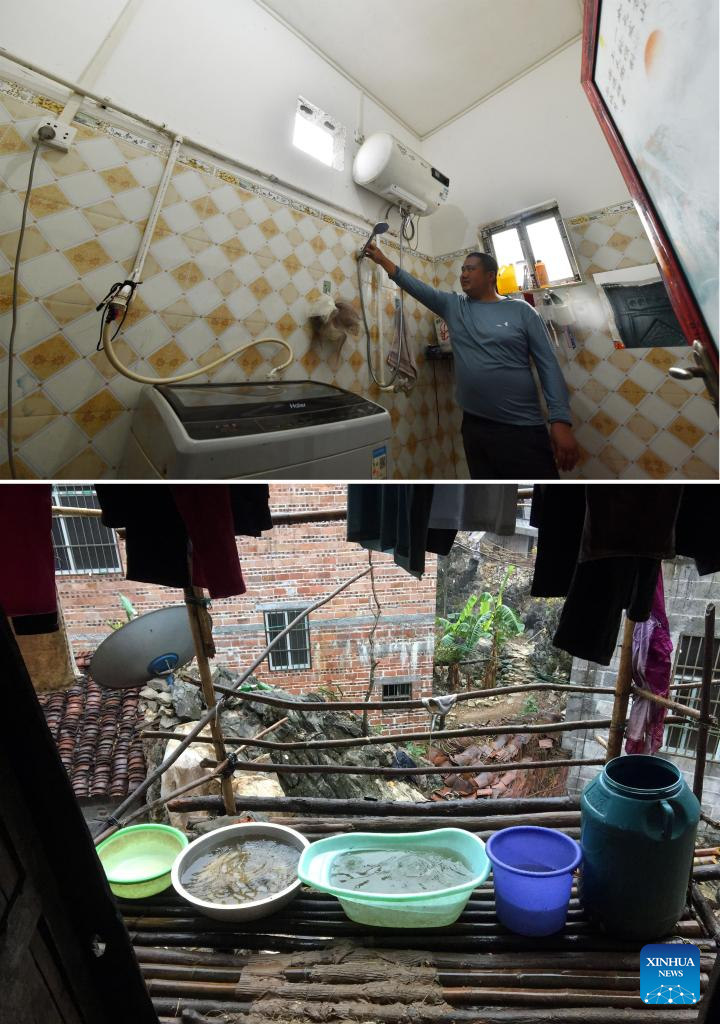
This combined photo shows villager Lan Caihong displaying a water heater and a laundry machine installed at his home in Nongyong Village of Bansheng Township, Dahua Yao Autonomous County, south China's Guangxi Zhuang Autonomous Region (Top, taken on Jan. 21, 2023) and villager Lan Caihong collecting rainwater with buckets and pots under his roof at his home in Nongyong Village (taken on Feb. 14, 2015) .
Situated at the center of the Karst landforms in west Guangxi, Dahua Yao Autonomous County had suffered from severe water deficit for ages. Since 2012, local government has been managing the water deficit through various measures like building water tanks or reservoirs to collect water or constructing water supply projects which could divert river water onto mountain areas to ease water shortage and provide safe drinking water for local people. Afters years of efforts, safe and convenient water supply is no longer a problem for the over 200,000 rural population in Dahua. (Xinhua/Huang Xiaobang)
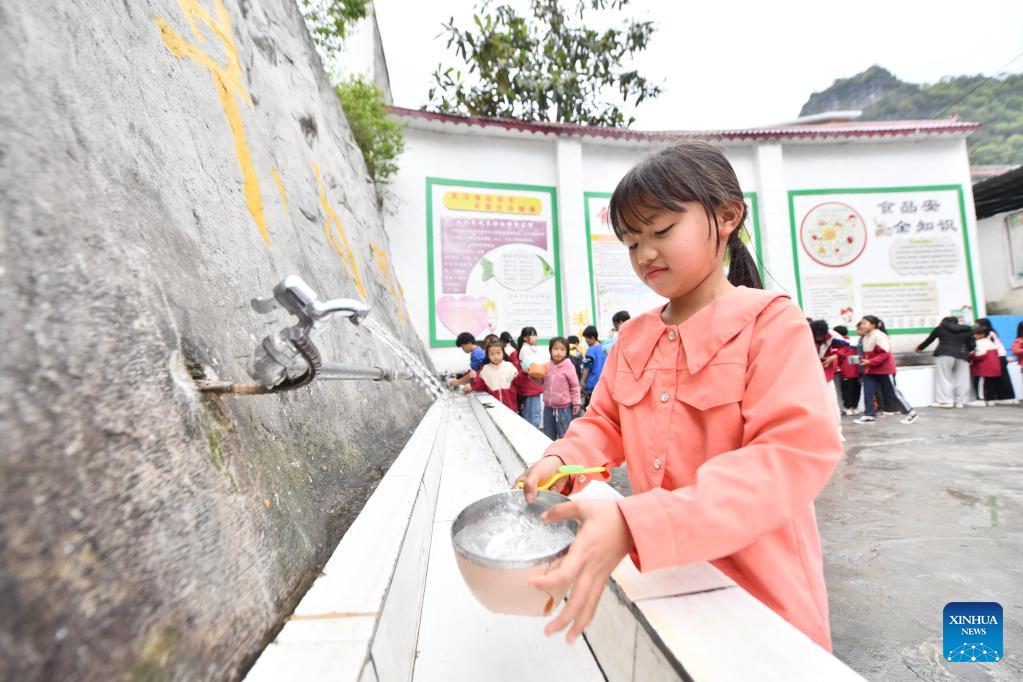
This photo taken on March 20, 2023 shows a girl washing her bowl with tap water at Bahao elementary school in Bansheng Township, Dahua Yao Autonomous County, south China's Guangxi Zhuang Autonomous Region.
Situated at the center of the Karst landforms in west Guangxi, Dahua Yao Autonomous County had suffered from severe water deficit for ages. Since 2012, local government has been managing the water deficit through various measures like building water tanks or reservoirs to collect water or constructing water supply projects which could divert river water onto mountain areas to ease water shortage and provide safe drinking water for local people. Afters years of efforts, safe and convenient water supply is no longer a problem for the over 200,000 rural population in Dahua. (Xinhua/Huang Xiaobang)
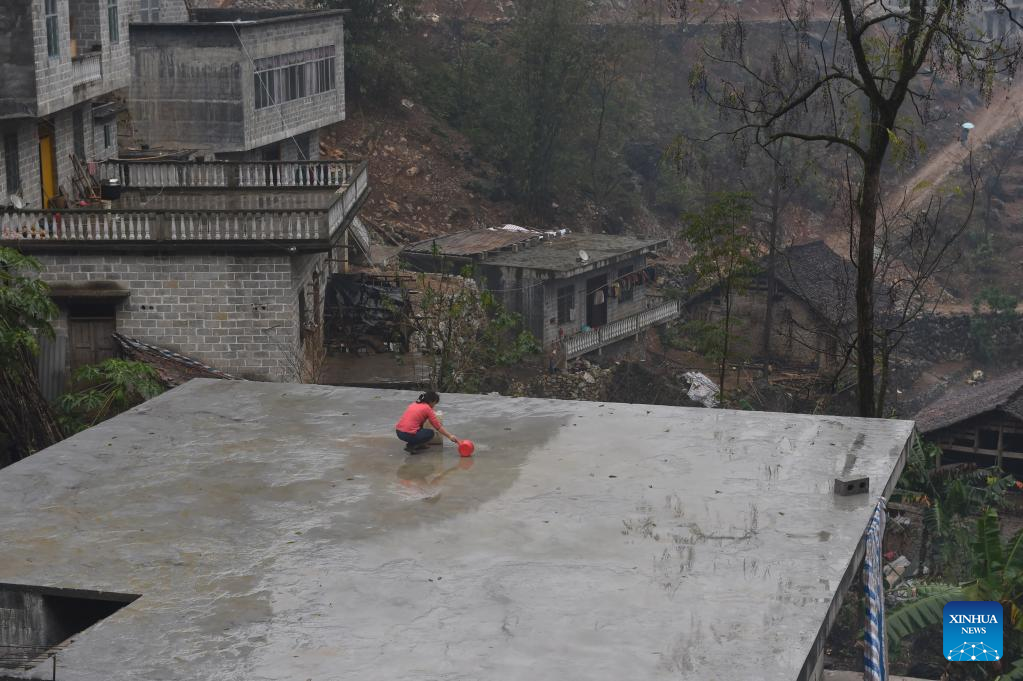
This photo taken on Feb. 12, 2015 shows a villager collecting rainwater on rooftop after a heavy rainfall in Nongyong Village of Bansheng Township, Dahua Yao Autonomous County, south China's Guangxi Zhuang Autonomous Region.
Situated at the center of the Karst landforms in west Guangxi, Dahua Yao Autonomous County had suffered from severe water deficit for ages. Since 2012, local government has been managing the water deficit through various measures like building water tanks or reservoirs to collect water or constructing water supply projects which could divert river water onto mountain areas to ease water shortage and provide safe drinking water for local people. Afters years of efforts, safe and convenient water supply is no longer a problem for the over 200,000 rural population in Dahua. (Xinhua/Huang Xiaobang)
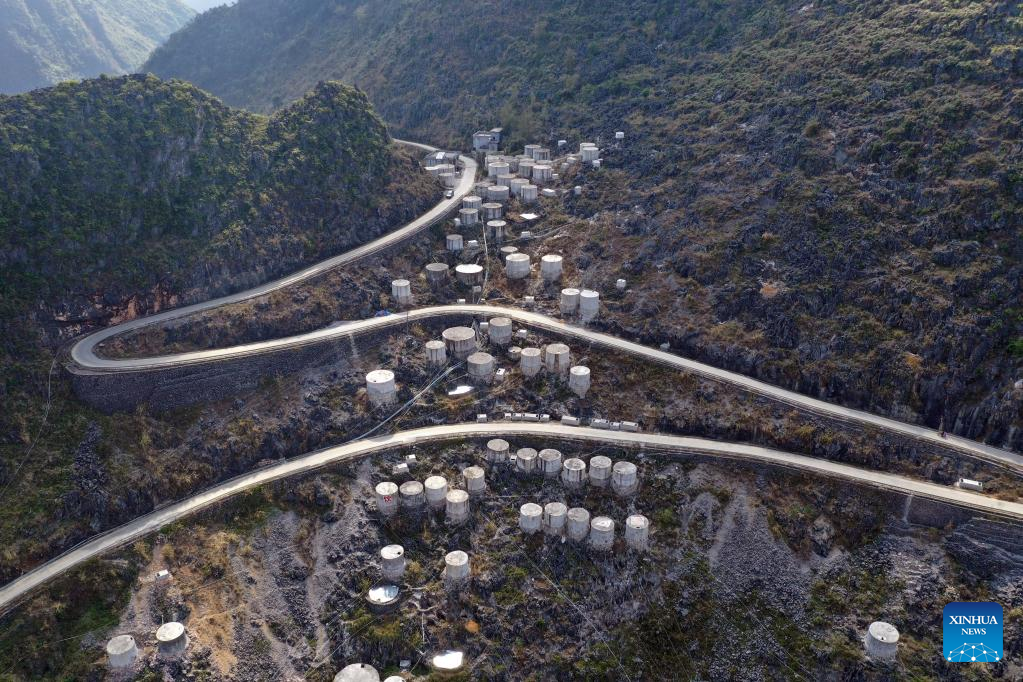
This aerial photo taken on Feb. 6, 2021 shows household water tanks in Shanghe Village of Jiangnan Township, Dahua Yao Autonomous County, south China's Guangxi Zhuang Autonomous Region.
Situated at the center of the Karst landforms in west Guangxi, Dahua Yao Autonomous County had suffered from severe water deficit for ages. Since 2012, local government has been managing the water deficit through various measures like building water tanks or reservoirs to collect water or constructing water supply projects which could divert river water onto mountain areas to ease water shortage and provide safe drinking water for local people. Afters years of efforts, safe and convenient water supply is no longer a problem for the over 200,000 rural population in Dahua. (Xinhua/Huang Xiaobang)
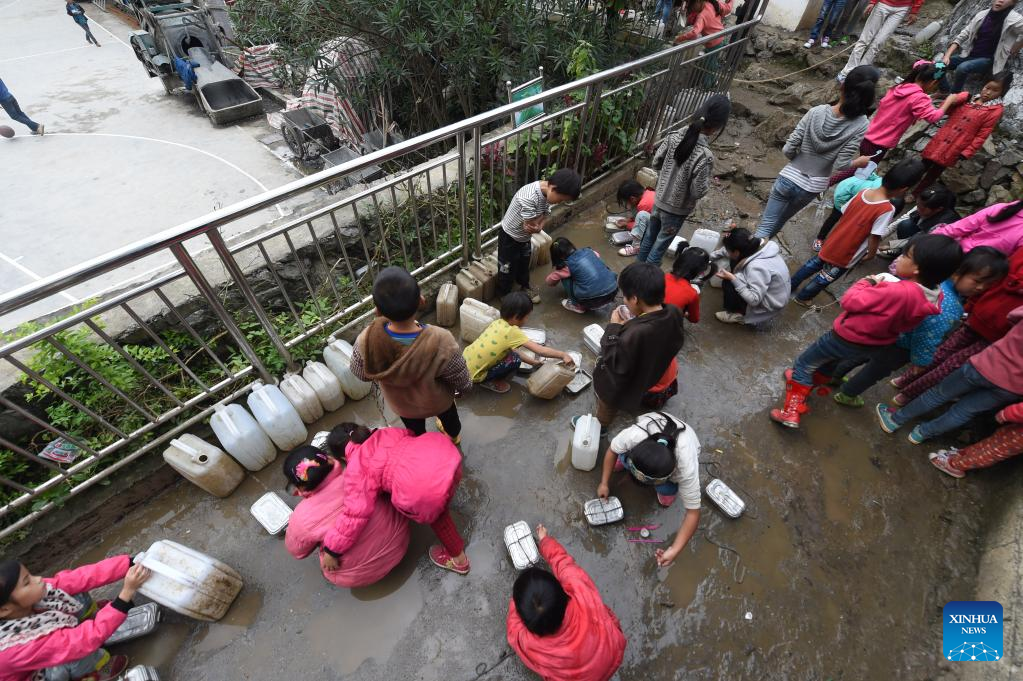
This photo taken on Nov. 24, 2014 shows pupils washing and cooking rice with rainwater stored in plastic buckets at Bahao elementary school in Bansheng Township, Dahua Yao Autonomous County, south China's Guangxi Zhuang Autonomous Region.
Situated at the center of the Karst landforms in west Guangxi, Dahua Yao Autonomous County had suffered from severe water deficit for ages. Since 2012, local government has been managing the water deficit through various measures like building water tanks or reservoirs to collect water or constructing water supply projects which could divert river water onto mountain areas to ease water shortage and provide safe drinking water for local people. Afters years of efforts, safe and convenient water supply is no longer a problem for the over 200,000 rural population in Dahua. (Xinhua/Huang Xiaobang)




 A single purchase
A single purchase








